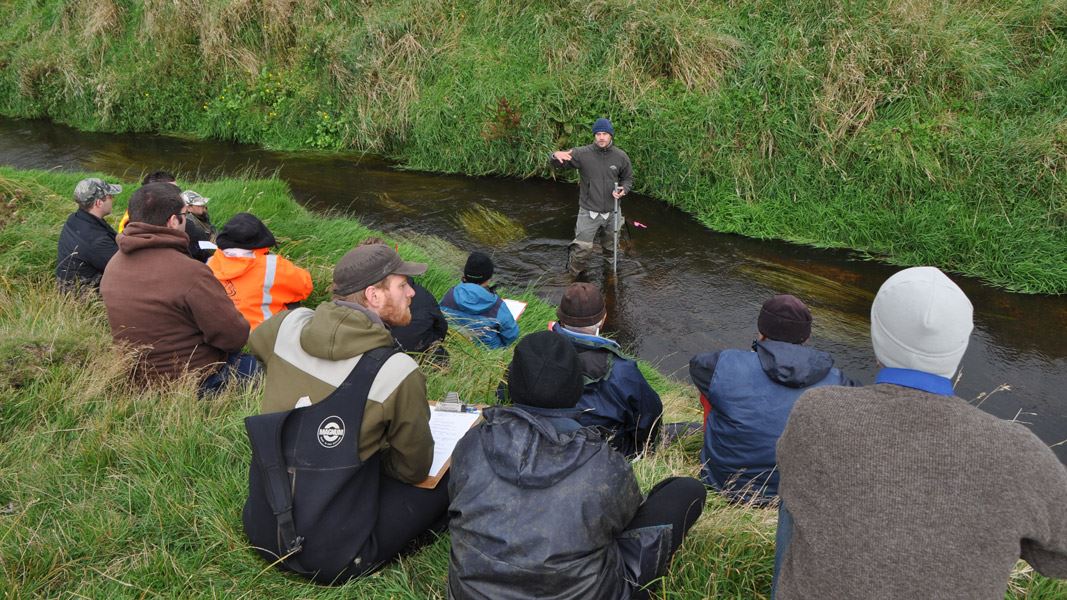Our vision: Science leadership for freshwater ecosystem conservation in New Zealand
To manage our wetlands, lakes, rivers and estuaries effectively, we need to understand the ecological processes that keep these areas healthy and resilient.
Currently, we have incomplete information on some critical ecosystem threats, which limits our efforts to protect the health of the wetlands.
Scientific research is helping to fill this gap. Scientists and wetland managers are working together to develop useful tools for management and monitoring as well as setting goals and best practice guidelines for restoration.
Science themes
We have four overarching research themes:
Ecosystems – landscape-scale restoration
We're working on improving tools to eradicate browsers and weeds in wetlands, and finding effective landscape-scale methods for wetland forest restoration
Water – addressing catchment pressure
As part of our focus on enhancing water quality and water levels we are defining ecologically appropriate hydrological regimes for lakes and wetlands, and determining the capacity of wetlands to attenuate sediment and nutrients.
Species – status and recovery
We're aiming to improve methods to protect threatened wetland birds, fish and plants, with a focus on broad-scale predator management, habitat protection and innovative monitoring tools.
Monitoring – streamlined reporting systems
We're working on improved reporting of the difference made in restoring wetlands, increasing application of cultural health assessment tools, and advancing our use of remote sensing and new technology in wetland monitoring.
View the Research report card (PDF, 2,281K)
Research opportunities
Arawai Kākāriki science benefits from working with research students, universities and other research groups.
Our current focus areas are:
- Adaptive management of predators and browsers in wetlands – developing broad-scale pest control tools to achieve flora and fauna recovery.
- Achieving natural succession of lowland wetland forests – rapid methods for restoration of kahikatea and other forest species.
- Restoring wetland hydrology – defining ecologically appropriate water regimes for wetlands and lakes.
- Understanding of the contribution of wetlands to climate resilience (carbon storage and carbon cycling) and their vulnerability to a changing climate.
- Tipping points for wetlands – understanding the impacts of sediment and nutrients on wetland health.
- Conservation of cryptic wetland birds – gaining knowledge of threatened bird survival and productivity.
- Conservation of threatened freshwater fish – understanding the conservation requirements for giant kōkopu, upland longjaw and black mudfish.
- Methods for recovery of nationally threatened plants.
Interested in research with us? Get in contact at arawai_kakariki@doc.govt.nz.
Research partnerships
Our research partnerships are with:
Lakes380 research programme – GNS Science and Cawthron
Lakes380 and Arawai Kākāriki have teamed up to improve our understanding of several Ō Tū Wharekai lakes and Lake Moawhitu. The programme aims to use sediment cores to build a picture of the environmental history of 380 lakes across New Zealand.
Restoring Wetlands Programme – Manaaki Whenua/Landcare Research and NIWA
Resilient Wetlands is a research programme (previously Restoring Wetlands) that's focused on best-practice wetland restoration. Research has been carried out at Whangamarino and at Ō Tū Wharekai.
Lakes Resilience Programme – Cawthron, NIWA, University of Waikato, University of Otago
Lake Resilience is a four-year programme that increased knowledge about how lakes respond to environmental pressures and management actions, including research on eDNA and water quality at Ō Tū Wharekai lakes and fish habitat at Lake Moawhitu.
Wetland Assessment and Monitoring Tool – Manaaki Whenua/Landcare Research
The WAAM research programme is developing an innovative tool using ancient preserved DNA, radiocarbon dating, charcoal and element analysis to assess the current health of wetlands relative to their history over the past 2000 years.
Monitoring partnerships – Environment Southland, Waikato Regional Council, Environment Canterbury
Arawai Kākāriki carries out monitoring work in conjunction with regional councils at each of the main sites across New Zealand.
NZ Wetland Restoration Symposium – National Wetland Trust
National Wetland Trust organises the biennial wetland symposium – New Zealand's leading gathering of community groups, landowners, iwi, scientists, wetland managers and students who are interested in sharing and learning about wetland restoration. The symposium is supported by Arawai Kākāriki.
Science bibliography
Some of our key research:
- Estimating carbon emissions from peatland fires at Kaimaumau–Motutangi and Awarua wetlands (PDF, 1,324K)
- Wetland reserves in New Zealand
- Protocols for monitoring Australasian bittern (PDF, 4,143K)
- Impacts of mammalian predators on wetland birds
- Guidelines for the assessment of potential Ramsar wetlands in New Zealand (PDF, 667K)
All of our publications have been collated into the Arawai Kākāriki science bibliography (PDF, 1,110K).
Report cards
We publish a series of report cards each year to give communities and our partners a brief snapshot of the achievements and progress of Arawai Kākāriki.
See the Arawai Kākāriki report cards.
